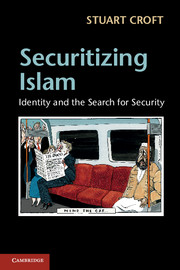Book contents
- Frontmatter
- Contents
- Figures
- Tables
- Acknowledgements
- Introduction
- 1 Ontological security and Britishness
- 2 A post-Copenhagen securitization theory
- 3 ‘Two World Wars and one World Cup’
- 4 ‘New Britishness’ and the ‘new terrorism’
- 5 The construction of ontological insecurity
- Conclusion
- Select bibliography
- Index
4 - ‘New Britishness’ and the ‘new terrorism’
Published online by Cambridge University Press: 05 June 2012
- Frontmatter
- Contents
- Figures
- Tables
- Acknowledgements
- Introduction
- 1 Ontological security and Britishness
- 2 A post-Copenhagen securitization theory
- 3 ‘Two World Wars and one World Cup’
- 4 ‘New Britishness’ and the ‘new terrorism’
- 5 The construction of ontological insecurity
- Conclusion
- Select bibliography
- Index
Summary
Introduction
The key contributions to individuals’ ontological security of the post-war construction of Britishness were all to the fore in the discourse of Tony Blair around the time of the millennium. In speeches in just a six-month period between December 1998 and May 1999 he spoke in favour of the just use of force; of the particular nature of the British; of the value of pragmatism; in favour of meritocracy; and in support of tolerance. Each of these values had become part of the political mainstream, that which represented the nature of the British Self, things that could be articulated safely in the knowledge that they would represent what in national discourse was the new common sense.
Famously, he had spoken in detail about the search for moral certainty in the use of force in his ‘Doctrine of the International Community’. Initially speaking specifically about Kosovo, he had said: ‘No one in the West who has seen what is happening in Kosovo can doubt that NATO’s military action is justified … This is a just war, based not on any territorial ambitions but on values.’ Later in that speech he developed five generic tests for the just use of force. In terms of national exceptionalism, much of the case was made in terms of unique characteristics. As Blair said in a speech in December 1998:
I have said before that though Britain will never be the mightiest nation on earth, we can be pivotal. It means building on the strengths of our history; it means building new alliances; developing new influence; charting a new course for British foreign policy. It means realising once and for all that Britain does not have to choose between being strong with the US, or strong with Europe; it means having the confidence to see that Britain can be both. Indeed, that Britain must be both; that we are stronger with the US because of our strength in Europe; that we are stronger in Europe because of our strength with the US.
- Type
- Chapter
- Information
- Securitizing IslamIdentity and the Search for Security, pp. 159 - 199Publisher: Cambridge University PressPrint publication year: 2012



